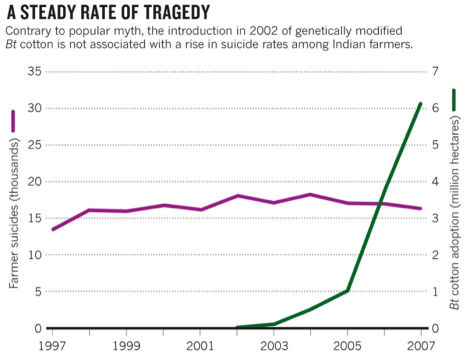Romantic environmentalists tend to get the big-picture problems right, while fudging the details. Rationalists nail the details, but sometimes become so immersed in the minutiae that they lose sight of the big picture.
Michael Specter’s New Yorker profile of Vandana Shiva, the environmentalist and crusader against globalization and Big Agriculture, is a portrait of someone who understands the big-picture concerns of green-inclined young people with great clarity. Specter quotes a few key lines from a speech she gave in Florence, in which she describes two great trends sweeping the world.
“One: a trend of diversity, democracy, freedom, joy, culture — people celebrating their lives.” She paused to let silence fill the square. “And the other: monocultures, deadness. Everyone depressed. Everyone on Prozac. More and more young people unemployed. We don’t want that world of death.”
This, to me, seems like a perfect framing of the ultimate preoccupations of many greens, myself included. Even larger than the threat of climate change (or the thing that makes climate change a threat) is the threat of deadening uniformity and the loss of diversity, beauty, and enchantment. These are the same problems of modernity that Allen Ginsberg was grappling with in Howl.
The problem is that, when Shiva gets to the details (what’s really driving these trends? What are the best solutions?), she frequently gets her facts very wrong. Then she repeats these myths, over and over again. Here are a few that Specter calls out:
Shiva said last year that Bt-[genetically engineered] cotton-seed costs had risen by eight thousand per cent in India since 2002. In fact, the prices of modified seeds, which are regulated by the government, have fallen steadily.
Shiva has accused the Bill and Melinda Gates Foundation of “attempting to impose ‘food totalitarianism’ on the world.” That’s certainly not the case in the foundation’s current incarnation — I looked closely at this issue here.
Shiva also says that Monsanto’s patents prevent poor people from saving seeds. That is not the case in India. The Farmers’ Rights Act of 2001 guarantees every person the right to “save, use, sow, resow, exchange, share, or sell’’ his seeds.
And then, of course, there’s Shiva’s most widespread claim: That farmers are killing themselves because GMO seeds mire them in debt. If this were the case, we’d expect to see an increase in the number of suicides as GMOs were introduced and became widespread. But the suicide rate among farmers in India remained level (here’s where I looked at this before). Check out this graph from Nature:
And though most of the public attention has focused on farmer suicides, it’s clear that the suicide problem in India extends far beyond agriculture. When scientists surveyed the problem, in a paper published in The Lancet, they found that “suicide deaths in unemployed individuals and individuals in professions other than agricultural work were, collectively, about three times greater than they were in agricultural workers.”
There’s a real danger when a big-picture romantic fixates on one particular devil as the root of all problems. Among activists trying to raise awareness about a problem, fudging details is commonplace and, maybe, inevitable. But if you are proposing solutions, it’s important to get the facts right. Is Shiva truly concerned about the suicides, or are the suicides just a handy tool to batter GMOs? If you want people in India to stop killing themselves, you have to pursue any good solution with equal vigor.
There just isn’t good evidence that GMOs are the cause of the problem, though there is plenty of evidence pointing to other causes. When Specter spoke with small farmers in India they told him the causes of farmer suicide were obvious: lack of crop insurance, lack of social safety nets, and lack of affordable credit.
Much of the concern over GMOs has to do with the fact that most were designed by companies primarily interested in making money, rather than scientists primarily interested in making the world a better place. As Madeline Ostrander showed in a recent piece in The Nation, many activists have no problem with genetically engineered plants created by public scientists. But Shiva opposes even publicly funded seeds, like disease-resistant cassava.
When I look for leaders, I look for people who are able to keep those soft, big-picture goals squarely in focus while they grapple with the nitty-gritty details. It’s the people with a combination of romantic and rationalist traits — with the heart of a poet and the mind of a mathematician — that make meaningful progress.
I’d like to think that Shiva could still become one of those people, but at this stage she has invested all her rhetorical capital on demonizing genetic engineering. I still think that Shiva’s big-picture critique is valid, and her work for social justice is valuable. I just wish that she’d accept reasonable evidence to figure out the causes of the problems she’s identified, rather that explaining away evidence by saying that Monsanto now “control[s] the entire scientific literature of the world.”




